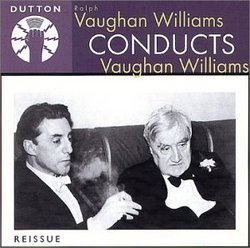Special and essential Vaughan Williams readings
Jeffrey Lee | Asheville area, NC USA | 05/30/2006
(5 out of 5 stars)
"Despite its less than modern sound, (though, I feel, pretty decent) this cd contains outstanding interpretations of two very different, yet deeply felt symphonies by the great British master, Ralph Vaughan Williams. The composer himself leads one of his most searing works, the F minor Fourth, while Sir John Barbirolli directs the poignant, spiritually satisfying D major Fifth. Respectively, the recordings were taped in 1937 and 1944. The passage of time, however, has dimmed neither the impact nor the images wrought by the conceptions of both conductors. To get some idea as to how good these accounts were (are) I have decided to compare them to Boult's readings of 4 and 5 from his frequently praised set of the Complete Vaughan Williams Symphonies on EMI stereo.
Directing the BBC Symphony in his Fourth Symphony, the composer seems to know exactly what he wants to say, and he says it, beginning with a gripping musical statement of the first movement. Here, he easily bests Boult in conveying the sense of anguish and turmoil. Though Boult gives a good account of the pensive second movement, the composer outdoes him by tapping into a deeper layer of concern. And, while Boult is quite solid too in the caper of the third movement scherzo and the shenanigans of the final movement, he is again outclassed by the composer with regard to sheer visceral excitement. Of course, Boult enjoys much better sound reproduction, and that is a definite plus ; however, the composer's near relentless intensity throughout is so overpowering that it nearly casts a shadow over Boult's fairly fine interpretation.
To my ears, Barbirolli and Boult offer two quite different views of the lovely Fifth Symphony. Boult sounds more extrovert and modern, Barbirolli more introvert and backward looking. Possibly more romantic too. My clear preference is for Sir John, and by a decent margin. I find Boult less cohesive and fluid throughout most of this piece. In some instances, for example, the third movement romanza, it's as if he has tied together sections of the music, while permitting the seams to show. In that same romanza, Barbirolli is not only better organized but also more deeply expressive. Listen to his characterization of the music's dramatic and mysterious portions. There are other moments, throughout the symphony, where he demonstrates a greater degree of tranquillity AND a more thrilling sense of rhythmic agility. Further, he conveys an impression of greater spaciousness and atmosphere, (even without the supposed advantage of stereo sound). Only in the final movement's passacaglia does Boult seem to demonstrate a near likeness to Barbirolli's approach. Here, he sounds more of one piece, and he engages a tenderly expressive reflectiveness. Nonetheless, Barbirolli shows fine confidence as he strides through the last movement's opening passages. After presiding over an impressive set of crests, he proceeds to the symphony's conclusion in wonderfully serene fashion.
Some may cavil with the lack of stereo sound, but if it's not a sine qua non for enjoyment, this particular disc is a must for Vaughan Williams lovers or anyone seeking a moving musical experience."

